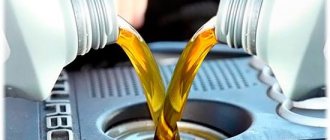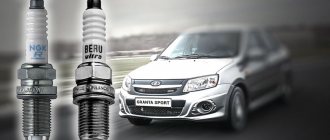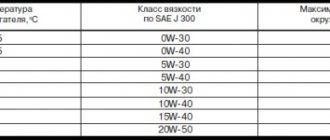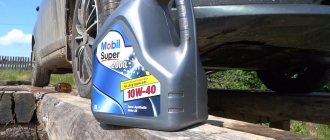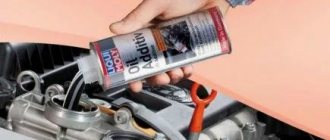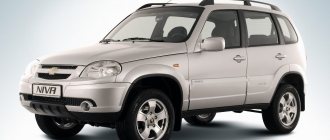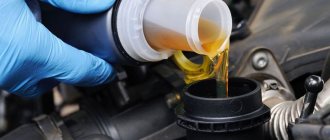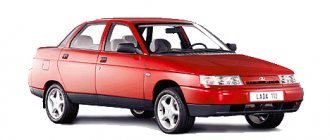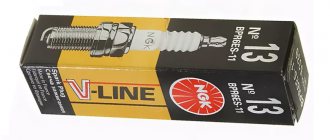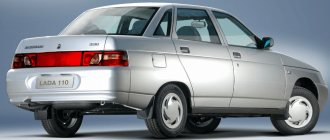I want to switch from Castrol 5w40 Magnatek... I’m thinking about these two brands. Maybe someone has already... I’m waiting for advice and wishes.
Comments 22
It is a pity that since ZIC motor oil began to be produced in plastic cans, many fakes have appeared. Still, the metal canister guaranteed quality and originality.
I use ZIC 5w30 8000 from oil change to oil change at the same level. Driving style: calm, rare anneals. The oil is very good, it does not burn out on its own, it is not much advertised, so there are few fakes for it. Even before Lancer, I poured it into Almera, which had a huge oil consumption, and so after switching to ZIC, oil consumption decreased by half!
I have already switched to ENEOS 530 half blue.
I use Zik. Everything is fine. And before that, for 2110 years, 3 years only Zik, semi-synthetic, excellent oil. Yes, and the mechanics advise Zik. The engine is clean after it. And Castro, they say there are strong deposits.
thank you all for the advice... I changed it today to Neste City Pro 5W-40... let's see how it performs in practice)))
I use mobile 5w40 but I advise you to read the oil club forum
So fill in Mobile or?
Yes, I don’t know what to tell you))) Mobile 1 is of course good, but it’s just a super mobile, I think it’s not a fountain, although I drive it myself! I won’t advise you anything because... I have no experience. but I don’t recommend pouring Motul either
what kind of nonsense about Zika? They sell the base to the same Castrol and Mobile, their additive package and that’s it! According to ZR tests, Zik retains its properties for longer than 15K km, unlike the popular brands. A taxi driver I know has been pouring only ZIK semi-synthetic into his Logan for 4 years now, the mileage is about 200k (and you can’t even count how much he put on xx in the winter), and the engine still pulls like new and there are no deposits or other crap under the valve cover! We draw our own conclusions! Another question for the creator of the topic - why 5w40, and not the regulation for 4g18 5w30?
I just bought a Japanese one already on these numbers) ... but what if I fill up with thirty, will it be better? I was going to change it ... zhora, as usually happens (judging by the forums) my Ulanych doesn’t have ... 600-800gr. for 7 thousand, I think it’s ok...I just read a lot))) all sorts of things about Castrol...like then it will be an ass after 100 thousand...so I don’t know whether to change the brand or continue to fill the pot. Mileage today is 90,500 km.
I’ll tell you this, and a pan of oil is fine if it’s not oil, but there’s a lot of oil in the vastness of Russia, and this ordinary empty oil costs 4 liters (in our TSC it’s from 1500 to 1900). Considering what I described, a semi-synthetic zik will do just fine (Americans and Japanese only pour mineral water into their engines and don’t have any problems). Tomorrow I’ll buy a replacement canister (it’s time to change it), for more than 7 thousand the internal combustion engine has consumed about half a liter of it (this is after decoking with a mileage of 191,000 km), and 5w30 is the regulated oil and you don’t need to listen to anyone about the old engine, etc. "Zhiguli" pour 5v40 and rejoice.
Engine oil parameters
There are three main oil parameters that will help the driver make a choice:
• oil viscosity is its state of aggregation (liquid, thick, solid), depending on temperature. Usually they take wide temperature ranges - from -30 to +100 degrees Celsius. This is one of the most important indicators, since it is the viscosity that determines the friction force with which the engine cylinders interact, and, as a result, the engine wear rate.
• alkalinity number is the content of ions in automobile oil that neutralize acids and oxides during engine operation. Measured in KOH/g. The higher the value of this parameter, the longer the oil will be able to neutralize the harmful acidic environment
• content of ions (calcium, phosphorus and others) – these substances determine the alkalinity number, the washing ability of oils and their anti-wear properties.
The combination of these indicators determines the quality of the motor oil and its focus: additional protective properties or better engine performance. Currently, according to the “auto review” rating for 2014, the most popular among them are the products of Shell and Mobile companies.
They are similar: they are synthetic, high-quality oils with their own place in the market.
This statement leads to the question: “Which one is of better quality?”
To answer this, let’s analyze the viscosity, base number and content of various ions.
Main indicators of oil quality.
The cost of motor oil does not play such a role for many people, until the question of engine overhaul arises, and it becomes clear that saving in the choice of motor oil is inappropriate.
But it doesn’t make sense to overpay for a brand label, which is why we’ll look at the characteristics by which you need to choose an oil; the characteristics given below apply to all types of oils.
- Acid number
- The lower this number, the longer the oil life; it shows the amount of oxidizing agents. - Dispersion
– The ability of an oil to resist contamination of treated surfaces. - Change in viscosity
– If there is less polymerization, the engine oil has greater stability. - Thermal-oxidative stability
- An indicator that determines the amount of acids and resins formed when the oil is tested at a temperature of 240 degrees. - Amount of sulphate ash
– Mass fraction of additives. - Dynamic viscosity
- This indicator affects the number of crankshaft revolutions during a cold start. - Oil density
- Determined by testing the oil at a temperature of 20 degrees. - Flash point
– The ignition temperature of the oil. - Alkaline index
- The number of additives that complement the properties of the base components of motor oil. - Viscosity
– Viscosity at a certain temperature. - Kinematic viscosity
- Oil heated to 100 degrees is tested in a viscometer.
Analysis of the chemical properties of Shell and Mobile oils
Analysis of chemical composition and base number The chemical composition of automobile oil is determined by its additive elements, the content of which is measured in milligrams per kilometer. These elements include calcium, phosphorus, zinc, boron, and magnesium ions. In terms of the content of calcium ions, Mobile or Castrol oils have an undeniable advantage.
It contains more than 2000 mg/kg, compared to 1354 mg/kg Shell oil. The amount of magnesium is approximately the same. The content of phosphorus, zinc, boron is also higher in Mobil products, but it cannot be said that the difference between these indicators is great - on average, the deviation reaches 10%. However, Shell oil contains 2 times more barium than its competitor - 14 mg/kg. It is noticeable with the naked eye that Mobile oil is significantly ahead of Shell in terms of the content of various ions. This quantitative advantage results in a higher TBN: on average, Mobile oils show values in the region of 9.5 mg KOH/g, while Shell oils have a value of about 5.40 mg KOH/g. An interesting feature of Mobile oils, which significantly improves the functionality of the product, is the molybdenum content. This metal protects the engine from wear and reduces the effect of friction. Its mechanism of action is simple - it fills microcracks, increasing the smoothness of the surface. The average molybdenum content in Mobil oils is 150 mg/kg.
Despite Shell's apparent lag in terms of quality composition, empirical experience shows that the compared oils show equally good performance in terms of engine wear protection. The only significant difference between them is the difference in protection between aluminum and steel parts, which has been studied due to trace concentrations of iron.
Mobile oil shows the best results when working with an aluminum engine, and Shell oil - with a steel one. Also, in practical use, these oils show almost the same ability to protect against acids and various oxides. Despite the fact that Shell oil has an alkaline number almost twice as low as Mobile, it maintains the permissible acidity level no worse. Comparison of physical properties It has already been said that viscosity is one of the significant parameters of automobile oil.
What's the result?
As you can see, ZIC oil cannot in any way be considered a bad product, but it would be a mistake to believe that it will be better than expensive analogues from the famous Shell, Mobil or Liqui Moly. In other words, as practice shows, such a product can be safely rated a solid four, but nothing more.
Experienced drivers and large sellers constantly emphasize that it is necessary to buy ZIC oil only at official points of sale. It was also noticed that a lot of counterfeit and non-original products are sold in the markets in small quantities.
At the same time, non-original oil is usually found in plastic containers, while among ZIC in a tin can, counterfeit oil is also found, but much less frequently. For this reason, it is important to know how to distinguish real motor oil from a fake.
Engine oil viscosity, what is the difference between oils with a viscosity index of 5w40 and 5w30. Which lubricant is best to pour into the engine in winter and summer, tips and recommendations.
How to choose the right engine oil for an old internal combustion engine or an engine with a mileage of more than 150-200 thousand km. What you need to pay attention to, useful tips.
How to choose the right motor oil for your car engine. Oil base of the lubricant, marking and classification according to SAE, API and ACEA. Useful tips.
What is better to use: synthetic or semi-synthetic oil. When is it optimal to fill the engine with synthetics and in what cases is it a semi-synthetic product?
When should you change winter oil to summer oil? What summer oil is best to use? What you need to know about tolerances and oil viscosity so as not to harm the engine.
Features of selecting engine oil for winter. Which all-season oil is considered winter according to the labeling, what should you consider when choosing.
Probably every sane person understands that without a substance that lubricates mechanical components and assemblies, not a single car will go far. Moreover, it simply won’t start. Therefore, automobile oil for the engine, as well as for the transmission, is one of the most important components that ensure long-term, trouble-free operation of all vehicle components.
Shell and Mobil at low temperatures comparison
In order to compare Shell and Mobile products, it is necessary to monitor the behavior of these oils at low temperatures and high temperature conditions. Tests have revealed that Shell oil is thickest at 100 degrees Celsius, that is, at engine operating temperature. It is superior not only to synthetic Mobil or Castrol, but also to semi-synthetic samples Motul or G-Energy. The low-temperature properties of the compared pair are excellent. Even at a temperature of -27, the oils retained a liquid state of aggregation, thickening slightly, and ensured stable engine operation and quick engine start - within 3 seconds.
Test table for 5w30 motor oils
The tests used synthetic oils with a viscosity of 5w30 from the most famous brands: mobil, zic and shell, as well as not very popular ones: bizol, comma, console, etc. For your convenience, we have included color markers in each table.
| Leaders | quality indicators |
| bold font | red font |
Table of quality indicators for 5w30 oils guaranteed by the manufacturer
| Sample | Kinematic viscosity at 100° | Viscosity index | Base number | Density | Pour point |
| POLYMERIUM XPRO | 10.5 | 195 | 10.2 | 870.5 | -44 |
| BIZOL FORMULA | 13.9 | 178 | 7.17 | 867.7 | -28 |
| COMMA EUROLITE | 14.1 | 178 | 7 | 642.7 | -30 |
| CONSOL ULTRA | 13.94 | 180 | 8 | 856.7 | -30 |
| MANNOL LEGEND ESTER | 13.58 | 184 | 8.16 | 850 | -29 |
| LIQUI MOLY SYNTHOIL ENERGY | 13.88 | 183 | 6.7 | 858 | -33 |
| ELF EXCELLIUM | 13.15 | 172 | 10.52 | 846.2 | -30 |
| SINTEC ULTRA | 14.53 | 171 | 9.14 | 851.3 | -27 |
| VALVOLINE DURABLEND | 13.28 | 183 | 9.54 | 849.3 | -31 |
| JB GERMAN OIL FORMULA XXL | 14.57 | 184 | 7.84 | 850.7 | -30 |
| TEXACO HAVOLINE | 13.48 | 182 | 7.14 | 850.2 | -26 |
| SPECTROL POLARM | 13.92 | 184 | 6.26 | 817.2 | -31 |
| A.G.A. | 13.87 | 182 | 6.77 | 840.4 | -30 |
| SHELL HELIX PLUS | 14.23 | 187 | 9.405 | 849 | -39 |
| ZIC XQ | 14.70 | 190 | 8.900 | 860 | -35 |
| MOBIL SUPER S | 14.27 | 192 | 6.530 | 858 | -32 |
The leaders in this table are the following synthetic motor oils:
- POLYMERIUM XPRO1
- Zic XQ
- Shell Helix
- Mobil Super
Table of 5w30 oil test results, the indicators we derived
We did not include some manufacturers in the table!
| Sample | Kinematic viscosity at 100° | Flash point | Pour point | Base number | Density at 20C* | Sulfate ash content | Dynamic viscosity |
| POLYMERIUM XPRO1 | 10.9 | 235 | -45 | 10.4 | 0.950 | 1.1 | 4300 |
| MOBIL SUPER S | 14.27 | 228 | -32 | 6.530 | 0.863 | 1.11 | 4100 |
| ESSO ULTRA | 13.7 | 215 | -35 | 6.400 | 0.850 | 0.99 | 4300 |
| BP VISCO 3000 | 14.88 | 218 | -38 | 7.615 | 0.873 | 1.11 | reolexia |
| SHELL HELIX PLUS | 14.23 | 226 | -39 | 9.405 | 0.863 | 1.185 | 3900 |
| COMMA EUROLITE | 13.78 | 223 | -31 | 6.525 | 0.871 | 0.975 | 3600 |
| BIZOL FORMULA | 13.46 | 210 | -28 | 8.325 | 0.830 | 1.14 | 5800 |
| VALVOLINE DURABLEND | 13.81 | 226 | -29 | 8.305 | 0.810 | 1.14 | reolexia |
| LIQUI MOLY SYNTHOIL ENERGY | 14.20 | 220 | -33 | 8.380 | 0.875 | 1.10 | 3700 |
| ZIC XQ | 14.70 | 224 | -35 | 8.900 | 0.900 | 1.120 | 4000 |
The overall test results clearly show the leaders among 5w30 synthetic motor oils, these are the following oils:
- POLYMERIUM XPRO1
- MOBIL SUPER S
- SHELL HELIX PLUS
- ZIC XQ
Oils you should give preference to
- these are ZIC XQ, SHELL HELIX PLUS and MOBIL SUPER S and POLYMERIUM XPRO1 - here you can personally learn about all their products in more detail -
go to
POLYMERIUM.RU. These oils have a reasonable price, they show excellent viscosity at very low temperatures!
Remember that the choice of engine oil always remains with the end consumer, based on his individual needs, the needs of his car and the conditions in which the car is operated!
Oil consumption "waste"
This parameter reflects the amount of oil that must be burned in a car engine for it to operate optimally. Accordingly, waste consumption is determined by the last but not least important indicator – efficiency. Shell, in this regard, demonstrate quite high consumption. Without adding oil, the engine is ready to operate up to 4500 km, after which the level begins to drop, and by 5000 km it will drop below the permissible minimum. Mobile is a more economical oil. The difference between the indicators is not so significant - its consumption is 3% lower than that of Mobile products. Therefore, it can be considered that Shell and Mobile, in this regard, do not demonstrate significant differences. The numbers show this: average fuel consumption when using Mobile oil is 11.32 l/100 km, and Shell is 11.39 l/100 km. To each his own In all basic parameters, the functionality of Shell and Mobile oils remains at a high level. Their chemical composition and physical properties ensure good engine performance and do not cause problems.
Brand awareness
Many car enthusiasts are not particularly versed in the intricacies of working at different temperatures or the chemical composition of oil, but prefer to choose a product that is well-known and has positive reviews among friends and experts. Both companies have deep historical roots and are well established in markets around the world.
Mobile is a North American corporation that has been in the lubricants market for 125 years. Over the years of its existence, it has absorbed several companies with less capital, and in 1999 it merged with the English giant Exxon. Today, sales volumes of this company's products rank second in America and are among the top five world leaders;
Shell is the largest corporation engaged in the production of automotive lubricants of various types, it was founded in the UK and the Netherlands, sales volumes confidently hold the first place in the world. Shell was created back in 1907.
To summarize, we can say that both companies producing motor oils are worthy of respect and produce high-quality products; focus on the fact that Mobile lubricants have a better chemical composition and their consumption is slightly lower. Among the advantages of Shell are good engine protection in hot weather and the presence of GTL oil in the product line.
So is it Shell or Mobile?
Both of these oils are good, but it is important to determine the optimal zone for their operation. If a car is operated in conditions where it is difficult to provide the car with high-quality fuel, then the car oil must have a large number of additive elements that will provide an increased alkaline number, like Mobile oils. It is also necessary that the car engine and oil match each other as closely as possible. As mentioned above, steel mechanics will be more to the taste of Shell, and aluminum mechanics will be more to the taste of Mobile.
After analyzing all these factors, the car enthusiast needs to make his own choice between these products. The operating conditions of the car, the quality of gasoline, climatic conditions - all this affects the performance of the oil. Therefore, the answer to the question: “Who is better, Shell and Mobile?” will be completely different in different situations.
Modern manufacturers of automobile oils
Lubricants for injection and diesel engines, as well as for automatic and manual transmissions, are produced by quite a few companies. It is impossible to single out which oil has the best characteristics for all operating conditions - there is no clear leader for the reasons described above. In addition, in different regions and climate zones, the preferences of motorists differ. Product prices play an important role in this. But the most popular, both in Russia and in other European countries, can be named.
Automotive oils from the above manufacturers are deservedly popular both in Russia and in other countries of the former CIS. The high level of competition motivates them to constantly search for new technologies and improve the quality of motor oils.
Which oil to choose: Shell or ZIC
Many car owners who independently maintain their vehicle choose one brand of motor oil and constantly use only that one. A rare exception is low-quality oil, after filling which you have to choose another.
There are quite a few manufacturers of automobile oils in the car market. Some of the most popular among them are Shell and ZIC. Let's try to figure out why car owners prefer them, and which of these oils is better.
Main selection criteria
For example, Shell and Mobil are the leaders in terms of prevalence in the Russian automotive chemicals market. Castrol is not far behind them. Let's try to figure out which oil is best to use in different climatic conditions. During combustion in the chamber, fuel leaves behind residual deposits and soot. These products do not disappear anywhere, depositing on the walls of engine parts. The task of lubricating fluids is not only to reduce the coefficient of friction between parts, but also to prevent chemical oxidation reactions and wash combustion products from parts. This is why it is so important to regularly change engine lubricant - because it has its own working life.
Types of Shell and ZIC oils
To make it easier to decide on the appropriate lubricant, it is worth noting the classification of all existing motor oils. And based on this, choose Shell or ZIK products. First of all, you need to pay attention to the composition of the oils. Both Shell Helix and ZIC come in three types:
- mineral;
- semi-synthetic;
- synthetic.
The main difference is the underlying base of the lubricant. Some use recycled oil, while others use an artificially created synthetic base. Semi-synthetic oils are obtained by mixing the first two options, and now they are perhaps more popular than all others.
In addition, lubricants from Shell and ZIC can be designed for use in gasoline or diesel engines. This is due to the peculiarities of internal combustion engines operating on different types of fuel.
Video tests of motor oils for 2022.
There is no point in writing about every motor oil, praising it or, conversely, emphasizing its shortcomings. We have provided tables with the most basic indicators of the quality of motor oils that will help you decide on the choice of motor oil for your car.
We have identified four winners in the 5w30 and 5w40 categories; if you have any doubts, the video test results will clearly show you the quality of Shell and Zic oils.
The tests are carried out by the Denis MECHANIK channel, they are filmed with very high quality and clearly show the advantages and disadvantages of engine oil even from top manufacturers
ZIC rules. Shell Helix Ultra is garbage!
As part of the 70 thousand maintenance for my Elantra, it so happened that I had to fill in ZIC 5w40
.
Before this I drove exclusively Shell Helix Ultra
5w30 or 5w40. The first start of the engine on the ZIC showed that the engine was a little quieter. I thought it was a placebo. But the first trip along the highway pleased me with the fact that the previously described engine hum at 120-140 km/h, which recently began to shift closer to 110 and 150 km/h, has noticeably decreased and now begins after 120 km/h, and stops at 140 km/h. .
Conclusion: you need to change oils more often, and not constantly drive with the same manufacturer. Now I want to try Modil 1. Somewhere I read good reviews from many users about how quietly and elastically the engine began to work when using some of the Modil1 oils, but as an urge, I can’t find where and which one they were talking about .
Re: ZIC rules. Shell Helix Ultra is garbage!
I fill up with Hyundai KIA Premium LF Gasoline SAE 5W20 SM/GF-4 (4L) motor oil 05100-00451 – Synthetic motor oil with improved performance characteristics. There is no fact that this is Total. I haven't heard of Mobis production. For example, Mobis boxes contain Valeo brake discs. They also sell Sax shock absorbers for Hyundai and Kia under their own brand. For example, under the original numbers 54651-3W050 you will receive a Sax shock absorber in a Mobis box, which is equipped with a 270-horsepower tGDI version of the Sportage. (The inscription Saks embossed on the piece of iron is carefully covered with a Mobis sticker)
Re: ZIC rules. Shell Helix Ultra is garbage!
. Yes sir. the oil is thicker. And a little quieter.
Re: ZIC rules. Shell Helix Ultra is garbage!
https://totalengineoils.com/classic-sn-gf-5-5w20/ Look at this Total, distributed for KIA and Hyundai. We only have Mobis in packaging. The reason is the agreement with Shell Europe (everyone saw the sticker)
Re: ZIC rules. Shell Helix Ultra is garbage!
I couldn't hear the difference between 5W30 and 5W40. Maybe those with locators have heard this difference.
If according to the ABC book it is 5W30 or lower, then nothing will happen since this is the factory recommendation.
Re: ZIC rules. Shell Helix Ultra is garbage!
Has only permission
Hyundai/Kia, but nowhere is there any information that these are oils or TOTAL products are used for initial filling in Hyundai/Kia engines. ?
But the company SK, i.e. ZIC oils and lubricants, use ZIC even at the development stage of Hyundai/Kia
Hyundai Motors and KIA Motors Korean automakers Hyundai Motors and KIA Motors form a single structure of the Hyundai Motor Group. At the end of 2012, the group entered the top five of the world's largest automakers, having sold more than seven million cars.
Engineers from both companies closely interact with each other. As a result, many key auto components, such as engines and gearboxes, are unified among these companies. Also, Hyundai and Kia, as a rule, maintain uniform standards for regular maintenance: intervals and requirements for the materials used, including a lubrication chart.
SK Lubricants and Hyundai Motor Group have a long-standing close relationship. SK Lubricants has been supplying various oils and fluids to company factories for several decades. Hyundai auto engineers and SK technical specialists meet regularly on work issues. As a result of such close interaction, many lubricants used in Hyundai and Kia cars appeared. These products include:
• synthetic transmission oil for manual transmissions (manual transmissions) ZIC GF TOP 75W-85 • synthetic fluid for 4- and 5-speed automatic transmissions (automatic transmissions) ZIC SP-III • synthetic fluid for 6-speed automatic transmissions (automatic transmissions) ) ZIC SP-IV • synthetic motor oil with low sulfur, phosphorus and sulfated ash content (Low SAPS) for diesel engines ZIC XQ LS 5W-30 • synthetic motor oil with increased fuel efficiency for gasoline engines ZIC LD 5W-30 (in retail sale in Russia and the CIS countries this oil is called ZIC XQ FE 5W-30) • special fluids for power steering ZIC PSF and ZIC PSF-3.
All these ZIC products are supplied to Hyundai Motor Group factories in South Korea, China, India, Turkey, Russia, Slovakia, Czech Republic, USA and Brazil.
In the near future, with the development of technology, new special ZIC oils and fluids are expected to appear for Hyundai and Kia.
And the most interesting thing is that SK is written on the packaging, something TOTAL has never had before
Properties
An important parameter is the physical and chemical characteristics. When comparing oils from Shell and ZIK, first of all you need to look at the alkalinity number, determined by the variety of additives introduced into the composition.
This parameter is measured in a ratio of 1/1000000, that is, milligrams per kilogram of oil. In addition to additives, good motor oils contain ions of many chemical elements, for example:
If we compare the alkaline number of the TOP lines of oils from Shell and ZIC, then the first company is ahead, here the values start from 1400 mg/kg. But in terms of the ratio of the amount of oil and added additives, the products from these companies are approximately at the same level.
Test results
Periodically, in Russian specialized laboratories, motor oil from the leading manufacturers listed above is checked according to the following parameters:
- kinematic and dynamic viscosity – all of the above are good; alkaline number (presence of additives) – a good indicator for Zik, Mobil, Shell, Castrol and Total; density - all correspond to the declared one; anti-wear properties are led by Mobil and Shell, with Total and Castrol slightly behind.
The final conclusion of Russian specialists, based on the results of the latest laboratory studies and tests, is that all of the above-mentioned companies produce oils capable of providing up to 300 thousand km of trouble-free service life for the vast majority of engines.
Under normal operating conditions, they are all suitable for use. Small differences are observed only under heavy loads and high temperatures, that is, in extreme conditions.
The summary is this: today it is impossible to single out an oil that will have the best characteristics in the entire variety of temperature and load conditions in engines. Moreover, each of the motors has specific features - for example, the size of the gap in the parts, as well as many other differences. This also affects the performance of lubricants. Buy something that meets the specifications of the car manufacturer and your preferences - as long as the working fluid is original and not counterfeit.
Source
Which is better to choose: ZIC or Shell Helix
According to tests and tests, oils from both manufacturers are characterized by improved fluidity, which contributes to increased engine efficiency, as well as easy starting of the internal combustion engine in cold weather.
Having systematized the reviews of car owners, we received some more data. There is an opinion that ZIC motor oils still have a weaker base, as a result of which it exhausts its service life faster than Shell Helix. At the same time, some believe that Shell burns out faster.
But, of course, these assessments are subjective, since much depends on the condition of the engine, the driving style, and the operating conditions of the car. Therefore, it is impossible to say unequivocally which manufacturer produces the best motor oils, Shell or ZIC - both companies produce high-quality products, the use of which will ensure the durability of the car engine.
5w40 oil test - the elite in the cylinders of our engines
The following samples were used as samples for testing synthetic motor oils with a viscosity of 5w40:
- POLYMERIUM XPRO1
- BP Visco
- Castrol Magnatec
- ELF Excellium
- Esso Ultron
- Mobil Super
- Shell Helix
- Total Quartz
- ZIC XQ
- ENEOS
- MOTUL 8100
- NESTE OIL
- HI GEAR
Let's do the 3 most important tests that will clearly show which oil is of better quality.
The first test is to check the oil for waste, the second test is for high-temperature deposits and the third test is the pour point of the oil.
Oil consumption table for waste
The burn data is indicated in liters per 10,000 kilometers in the highway driving cycle.
| Oil | POLYMERIUM | BP Visco | Castrol Magnatec | ELF Excellium | Esso Ultron | Mobil Super | Shell Helix | Total Quartz | Zic XQ | ENEOS | MOTUL 8100 | NESTE OIL | HI GEAR |
| Oil consumption | 0.5 | 1.4 | 0.9 | 1.3 | 1.3 | 0.7 | 1.0 | 1.5 | 0.6 | 1.2 | 1.0 | 1.2 | 1.4 |
The best results were shown by mala:
- POLYMERIUM 5w40
- Zic XQ
- Mobil Super
Examples of oil waste
High Temperature Deposit Table
Deposits were examined based on deposits on the surfaces of the pistons, points are given as follows: 0 points - the piston is clean, 2 points - there are a lot of deposits.
| Oil | POLYMERIUM | BP Visco | Castrol Magnatec | ELF Excellium | Esso Ultron | Mobil Super | Shell Helix | Total Quartz | Zic XQ | ENEOS | MOTUL 8100 | NESTE OIL | HI GEAR |
| Sediments | 0.7 | 1.5 | 1.5 | 0.9 | 1.2 | 0.9 | 0.7 | 0.8 | 0.7 | 1.1 | 0.9 | 1.2 | 1.5 |
The leaders of this test were:
- POLYMERIUM 5w40
- Zic XQ
- Shell Helix
Examples of high temperature oil deposits
- Click on the image to enlarge.
Pour Point Test Chart
Perhaps the most relevant test is the motor oil freezing test because... Our climate is quite harsh, regular warming up of the engine entails high fuel consumption, and everyone wants to start a car in the cold winter.
Why is Lukoil oil considered bad?
This myth appeared along with the company itself in the early 90s, when original Lukoil oil was in great short supply, so drivers bought a fake that did not live up to their expectations. The same story happened with other Russian companies producing motor oils - Rosneft and TNK . Another reason was to follow the instructions for foreign cars designed for good roads and high-quality gasoline. As a result, good oil lost its properties 2-3 times faster. What is most interesting is that if Lukoil or TNK was poured into the engine, then the mileage from replacement to replacement often reached 15 thousand kilometers, when almost nothing remained of the initial properties of the oil. However, after switching to Castrol or other branded oil, the mileage was sharply reduced to 5–7 thousand kilometers, which led to a much better effect of the oil on the engine.
Lada Vesta 2022, engine Gasoline 1.6 liter., 106 hp, Front drive, Manual — scheduled maintenance
Comments 40
It doesn’t matter, the main thing is that it’s not a fake. You don’t have a 1500 horsepower engine with 4 turbines, but a basin)
lei avtol and then for """boot advice)))))
Fill with KIXX, very good oil, now I’ll do that, I’ll fill it again
I drove, am driving and will continue to drive on liquid moth optimal 5W40.
There are so many people with so many opinions, it’s better to go to the oil club or motor oh website, there you will find out everything in detail about ZIK and Lukoil, and not only
I filled it with Lukoil Lux 5w30 and will continue to fill it, but everything else is a waste of money
I use Motul 6100 5w40 in my 1.8 and change it after 5000 km. The previous one with a 1.6 liter Motul 8100 5w40 engine. All is good. Comrade says Rosneft, changes it after 7000 km and doesn’t worry. So, decide for yourself what to do.
I skated 30,000 on the Zik X9 5w40 and 15,000 on the Zik X9 5w30. I changed 5w40 every 8000 km, burning about 300 g. For 5w30, for 15000 km I added about the same amount of 300-400 g.
Oil consists of a base and additives. Only three companies in the world make the basics. Zeke, Texaco and Lukoil. I use Lukoil in all my cars. As soon as Armotek appeared, I poured it. There is no waste even if you pile it on periodically
Zic. At first it cost a pretty penny in ’79, then in ’14, the engine ran quietly, there was no knocking and the oil was changed every 10k km. In winter, both started in a blink.
I also poured zik into Solaris, drove 180 thousand on it and everything is ok, I’m wondering how it will behave in Vesta’s internal combustion engine
He will behave normally. Still better than ours. Our oil is still not up to par with imported ones.
Source
Lukoil and foreign oils - comparison
For comparison, we selected several brands from which we took samples that corresponded in SAE and API to the same oils from Lukoil:
- Liqui Moly;
- Shell Helix;
- Mobil 1;
- ZIC.
For comparison, hundreds of owners of various cars were interviewed, differing both in year of production and place of assembly, but filling the engine with any oil from this list or Lukoil products. Most of the cars belonged to the golf class (including all front-wheel drive VAZs), produced between 1990 and 2016, but there were also commercial vehicles. The following questions were asked during the survey:
- brand and year of manufacture;
- engine condition and compression;
- engine operating mode and driving style;
- mileage before repair;
- oil used;
- frequency of oil changes.
According to the survey results, all cars were divided according to engine condition into ideal, normal and dead. After which the comparison of results began. And then it turned out that with a mileage of 5–7 thousand kilometers before an oil change, Lukoil oils are not inferior to any other oils of the same class. During normal operation of an engine with 10W40 Standard mineral oil from Lukoil, even a Gazelle truck with a ZMZ 402 engine ran at least 150 thousand kilometers before replacing the rings, and a major overhaul was carried out after 480 thousand kilometers under conditions of constant elevation changes (Sochi).
At the same time, the 1997 Volkswagen Transporter T4, running on Zikovskaya (10W40 A+) semi-synthetics and also driving around Sochi, required major repairs after only 130 thousand kilometers. The owner of the Gazelle changed the oil every 5 thousand kilometers, and the driver of the Transporter every 10 thousand kilometers. According to him, he wanted to change it every 15 thousand kilometers, as written in the car manual, but taking into account the difficult conditions (large elevation changes and frequent long climbs), he reduced it to 10 thousand kilometers. Similar results were observed with other cars - the frequency of oil changes and engine operating conditions, as well as the driver's driving style, had a much greater impact than the brand of oil.
